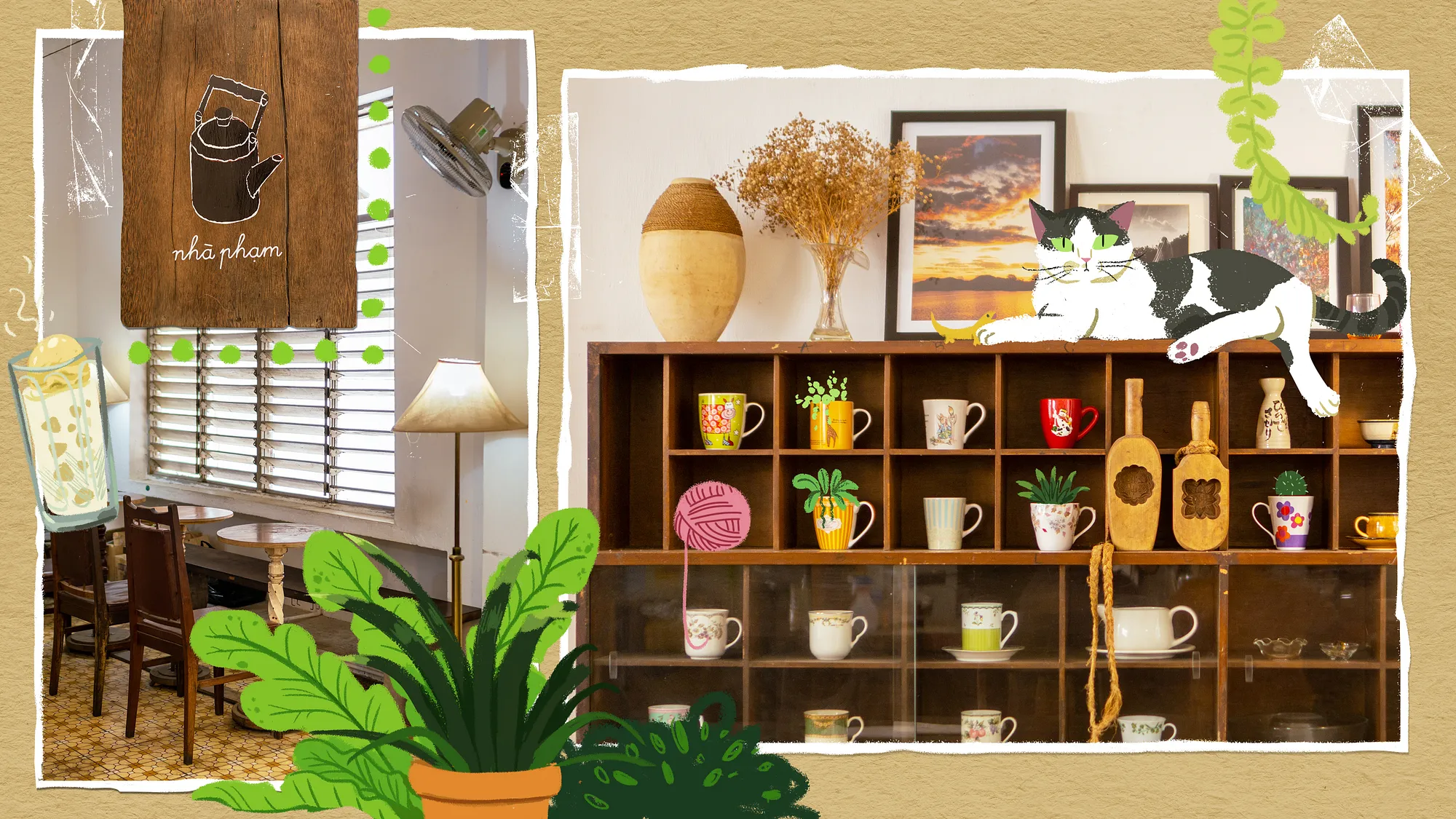Lychee tea can be found anywhere and anytime around Saigon, from street stalls to artisanal cafes. Averaging VND20,000–50,000, it’s a popular choice among Vietnamese youths. However, Thái Công Cafe prices their version of the fruit tea at around VND160,000 on their rather pricy menu. Yet, the drink remains extremely popular at the cafe and even went viral amongst Gen Z-ers on TikTok. The reason behind this virality is actually a meme.
Thái Công Cafe is the epitome of opulence, decked out in designer furniture that could cost more than a year’s salary, including a VND1.5 billion Louis Vuitton suitcase. The founder, the titular Thái Công himself, is a Vietnamese German interior designer famous for his lavish products and equally outlandish livestream sessions. His brand is built on elaborated designed pieces, and his social media presence features big-ticket objects, overseas trips, and even a now-infamous VND100 million hunk of Ibérico ham, the world's most expensive type of cured meat.

The ritzy interior of Thái Công Cafe.
Likewise, Thái Công Cafe reflects its creator's penchant for excess. The menu features highly marked-up cafe staples; slightly elevated classics, cocktails; and, of course, champagne bottles that cost much more than the average Saigoneer’s monthly wage. Even a simple Coca-Cola will sets you back VND110,000.
The justification that Công gives for his prices isn’t exactly the way the drinks are made or the ingredients used, but instead the utensils that the drinks come with, even though the customer can’t even take them home. For example, the reason why Thái Công lychee tea is so expensive is because the goblet that contains it costs around VND7 million (around US$280).

Thái Công Cafe's lychee tea is made from pink flamingo tea, lychee, and citrus syrup.
As for the drink itself, it’s a concoction of TWG pink flamingo tea, lychee, and citrus syrup. The drink was genuinely too sweet for my tastebuds, with the citrus syrup overpowering the aromatics of the tea and lychee flavor. Once I waited for the ice to melt to lessen the sweetness, the drink tasted like a very whisper of hibiscus and nothing of lychee. The million-dong glassware didn't seem much different from other receptables, apart from its noticeably heavier weight.
The main reason why this rather mediocre beverage managed to attract such attention was thanks to a meme that went viral from TikToker Phạm San (@pham_san1). In her review of the lychee tea, she says in a deadpan manner: “Today I will review Thái Công’s Cafe. This is the lychee tea. I always order lychee tea wherever I go. Today I will try the lychee tea here.” She then takes a sip of the tea and says, “I don’t like the lychee tea here.” It amassed millions of views before being deleted from the platform.
Thái Công himself hopped on the bandwagon with a parody video, replacing “I don’t like it” with “I like it,” cementing the meme's place in the platform’s ecosphere. Another famous recreation helping boost the trend's notoriety includes a version from TikToker Chị Ly, featuring a cheeky expressionless review.
During my recent visit to the cafe, prices have slightly dropped, and more food and beverage options have been added to the menu. The cafe is now less populated by influencers and chronically online Gen Z-ers. I watched as people entered the cafe, lavishly dressed in high-fashion clothing, ordering the famous trà vải to take numerous pictures of them with it. They then all stared at their phones while the ice in their VND160,000 drinks melted away. Perhaps anything related to Thái Công has always been like this, but it seems like the “Lychee tea” meme has now become a social status performance.

TikToker vs. Interior Designer
I must also highlight certain bizarre experiences I had when I visited the cafe. The cafe employs a doorman, which I thought was something unique to luxury apartment complexes and hotels. If you ask for the bathroom, a staff member will walk with you, all 5 meters from the bar to a door that's well-camouflaged as a wall. The restroom is adorned with a golden tap, golden handles and, for some reason, golden mirrors right where the toilet is. The golden decorations, coupled with the cafe's Birkin- and Rolex-clad clientele, make the entire experience feels like a nouveau riche simulation.
As I left the cafe, I couldn’t shake off the feeling that the Thái Công Cafe experience is less about the food and beverage aspect of a cafe, but instead, it turns out to be a bizarre spectacle of wealth and status. The meme originally did draw in people that visited the cafe out of curiosity or for a joke, but it seems now that the real attraction is a chance to perform wealth and to keep up with the trends.
In a city full of affordable and delicious street food options, as well as innovative cafes, Thái Công Cafe is less about taste and more about image. It’s ironic that the place puts such emphasis on the container of the tea rather than the drink itself. For some, that may be enough to pay VND160,000 for a drink, but I personally am happy with the lychee tea in a squishy plastic cup from a local street vendor.














